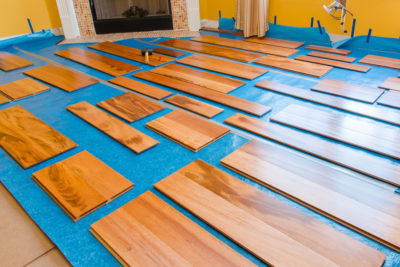New flooring offers you a way to reinvigorate a room or a new home. But even if you settle on hardwood, it’s not quite a done deal yet. That’s because when it comes to wood, solid hardwood flooring used to be your only choice. Now, you can choose between solid hardwood or engineered hardwood flooring.
It’s not an obvious choice either. Each offers some benefits but also brings some pitfalls. So, let’s jump in and take a look at some key considerations that will inform your choice.

Cost
Cost is a major factor in most remodeling projects. In many cases, it means choosing between what you want and what you can afford.
That isn’t the situation with solid hardwood and engineered hardwood flooring. All other things being equal, they cost about the same amount per square foot.
You can, of course, get less expensive versions of either kind of flooring. The catch is that you’ll probably end up with floors you don’t like. The hardwood won’t look as nice as you hoped or the engineered flooring won’t hold up well.
Refinishing
Diamonds might be forever, but the finish on hardwood flooring isn’t. If you live in the same house for a long time, you’ll start to see the wear and tear on the finish. Here’s how the two compare:
- Sanding is a key step in refinishing wood floors, which gives solid hardwood the advantage. You can sand and apply finish to solid hardwood over and over again without trouble.
- By design, only the top layer of engineered hardwood flooring is actual hardwood. It typically runs around 1/8 of an inch thick, though high-end versions offer somewhat thicker top layers. That means you can only sand it down once or twice before you replace it.
Installation Limitations
For all its longevity, you can only install hardwood in low-moisture areas of your home. That means areas like bedrooms, hallways, and living rooms.
Put it in a high-moisture area—like a kitchen or bathroom—and the wood soaks up the moisture and expands. In the best case scenario, the floor buckles. In the worse case scenario, the wood rots and damages the underlayment and joists.
This is where engineered hardwood wins: Engineered hardwood flooring stands up better to moisture because most of the layers in the flooring consist of plywood. Plywood doesn’t absorb water as readily, so it doesn’t expand or rot the same way.
While not ideal, you can install engineered flooring in kitchens and basements.
Solid or Engineered Hardwood Flooring?
Deciding between solid hardwood and engineered hardwood flooring depends on several factors. Ironically, for once, cost isn’t one of them.
A factor that does matter is how long you expect to live in the home, however. For instance:
- If you plan on living there for the foreseeable future, solid hardwood flooring is the right move. This is because you can refinish it again and again without concern.
- If you expect to sell the house within 5-10 years, engineered hardwood flooring offers more benefits. This is because you get the look and feel you want for now. And engineered flooring generally proves easier to remove. That can serve as a selling point for future buyers.
My Affordable Flooring specializes in flooring solutions in the Milwaukee area. For more information about a flooring type or a free estimate, contact us today.

You must be logged in to post a comment.